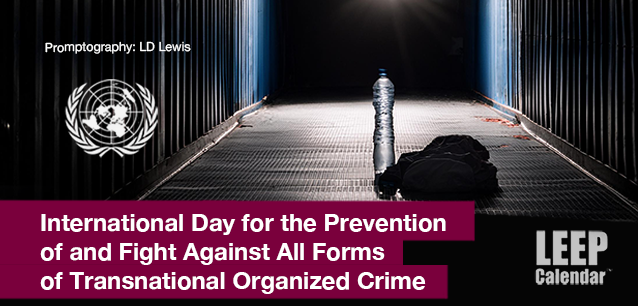 AD
AD
Today is: August 05
Scroll to explore events active on this date.
Additional Events on LEEP
LEEP INK FEATURES

May Blooms: Events in May 2025
Along with October, May is one of the most densely packed months of the year. It's before the summer humidity and the last whole month of the school year. The weather is warming in t...

Sweet June 2025
The solstice on the 20th marks the onset of summer (Northern Hemisphere) or winter (Southern Hemisphere). Many people, particularly in Europe, North America and Asia, will be embarking o...

Events in April 2025
Spring has sprung in the north, and the first hints of Autumn are on the horizon in the south. April is the month spring (or fall) gets underway, and it is filled with religious celebrations, including the Mu...
About International Day for the Prevention of and Fight against All Forms of Transnational Organized Crime
Safety & Security , Technology & Telecom
Alcohol Tobacco & Drugs , Civil Rights
Ends: Nov 15, 2025
DESCRIPTION:
INTERNATIONAL DAY FOR THE PREVENTION OF AND FIGHT AGAINST ALL FORMS OF TRANSNATIONAL ORGANIZED CRIME
The International Day for the Prevention of and Fight against All Forms of Transnational Organized Crime was established by the United Nations to address the global threat posed by organized crime. Initiated by the UN General Assembly, the event was first observed on July 26, 2019, marking a significant step in the international community's efforts to combat criminal networks that operate across borders.
This day aims to raise awareness about the dangers and impact of transnational organized crime, promote the implementation of comprehensive strategies to fight it and encourage international cooperation. It aims to mobilize governments, civil society, and individuals to take action against the various forms of organized crime, which include drug trafficking, human trafficking, arms smuggling, money laundering, and cybercrime.
Organized crime refers to criminal activities systematically coordinated and perpetrated by structured groups. These groups often have a hierarchical structure and are involved in various illegal enterprises to generate profit. Organized crime is characterized by its complexity, secrecy, and the use of violence or corruption to maintain control and influence.
TOP FIVE INDUSTRIES FOR ORGANIZED CRIME
Drug Trafficking
The illegal drug trade remains one of the most lucrative industries for organized crime groups. It involves the cultivation, manufacture, distribution, and sale of substances that are subject to drug prohibition laws.
Human Trafficking and Smuggling
Organized crime groups engage in the illegal trade of people for forced labor, sexual exploitation, and other forms of abuse. The smuggling of migrants also falls under this category.
Arms Trafficking
The illicit trade in firearms, ammunition, and explosives is a significant source of revenue for organized crime. It contributes to violence and instability in various regions.
Money Laundering
Criminal organizations often engage in money laundering to disguise the origins of their illicit gains. This process involves transferring money through a complex sequence of banking transfers or commercial transactions.
Cybercrime
With the advent of digital technology, organized crime has expanded into cyberspace. Activities such as identity theft, hacking, and online fraud are increasingly common.
ORGANIZED CRIME'S IMPACT ON SOCIETY
Organized crime affects a wide range of individuals and communities. Victims of human trafficking and drug abuse suffer severe physical and psychological harm. Businesses and governments lose billions of dollars annually due to fraud and corruption.
The impacts of organized crime on societies, economies, and general security are profound:
Societal Impact
Organized crime leads to increased violence and insecurity in communities. It fosters a climate of fear and mistrust, undermining the social fabric.
Economic Impact
The economic consequences include revenue loss, increased security and law enforcement costs, and damage to legitimate businesses. Money laundering and corruption distort markets and deter investment.
Security Impact
Organized crime groups often have links to terrorist organizations, posing a significant threat to national and international security. They exploit weak governance and fragile states, contributing to instability and conflict.
FIGHTING ORGANIZED CRIME
Combating organized crime requires a multi-faceted approach:
International Cooperation
Nations must collaborate through international treaties and organizations, sharing intelligence and coordinating efforts to dismantle criminal networks.
Legal Frameworks
Robust legal frameworks and law enforcement agencies are essential to prosecute and penalize those involved in organized crime. This includes the implementation of anti-money laundering laws and regulations.
Preventive Measures
It is crucial to address the root causes of organized crime, such as poverty, lack of education, and social inequality. Preventive measures also include public awareness campaigns and community engagement.
Technology and Innovation
Leveraging advanced technology and innovative strategies can help detect and prevent criminal activities. Cybersecurity measures and forensic tools are vital in the digital age.
Support for Victims
Providing support and protection for victims of organized crime is essential for their recovery and for dismantling the criminal enterprises that exploit them.
The International Day for the Prevention of and Fight against All Forms of Transnational Organized Crime reminds us of the global commitment needed to address this pervasive threat and protect communities worldwide.
VIDEOS
SUPPORTING DOCUMENTS
Currently, this event does not have supporting documents.
ADDITIONAL IMAGES
Currently, this event does not have supporting images.
Where would you like to go now?
 AD
AD


/footer-logo.svg)
